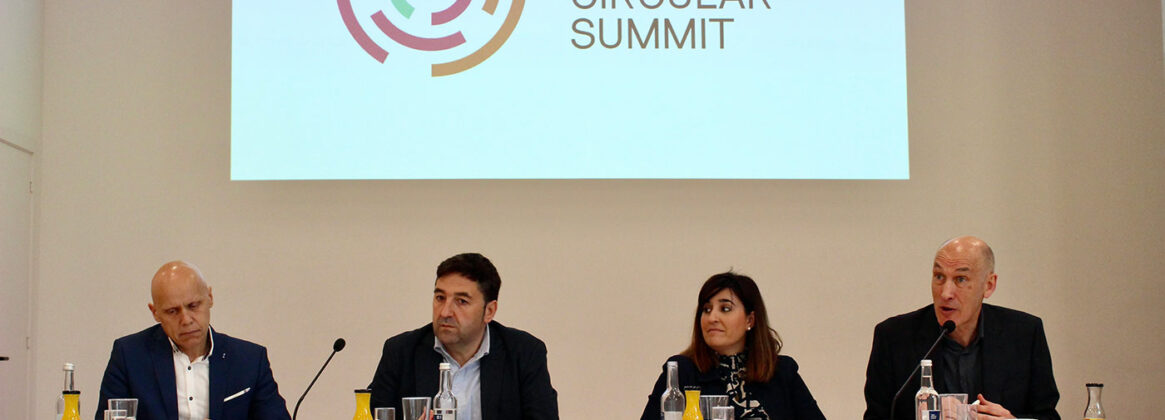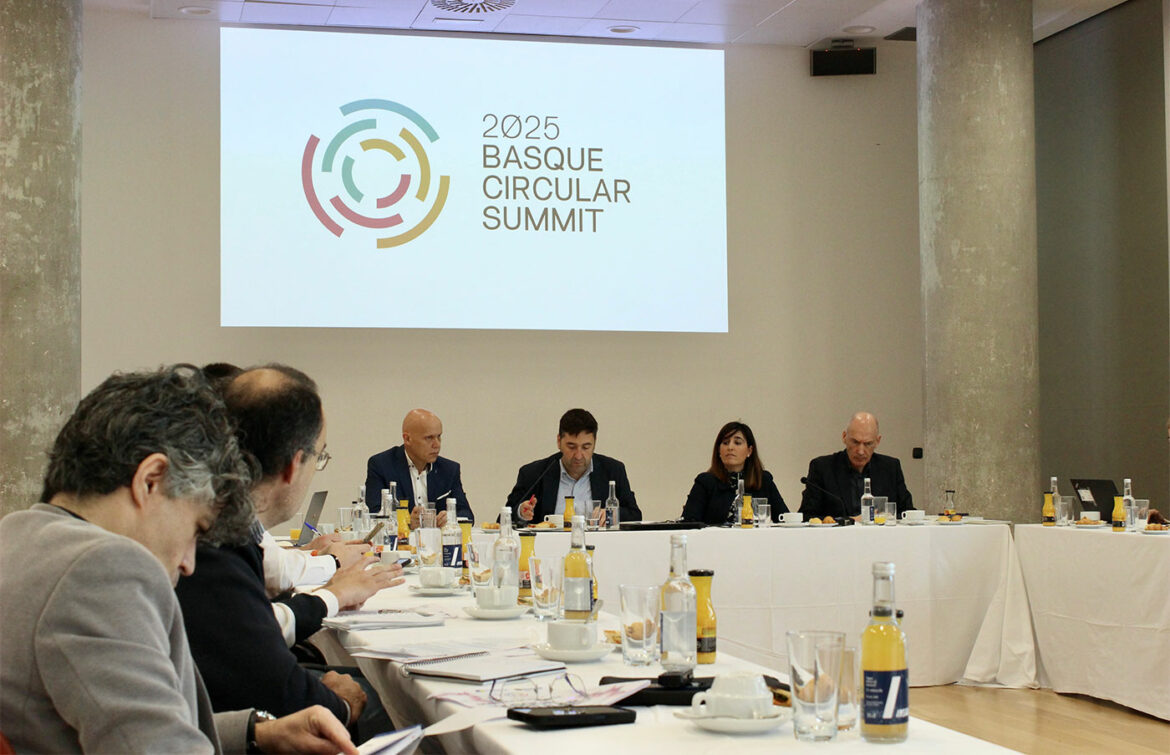

8 mins to read
Basque Circular Summit 2025 to prepare Basque companies for the ramifications of the new European Clean Industrial Deal
Author
admin
Published
2025/03/26
0 comments
Join the Conversation
- The Basque Government has so far been the driving force behind the creation of 5,000 direct jobs based on the circular economy.
- Since 2005, material consumption per inhabitant in the Basque Country has fallen by 8 tonnes, a figure that is above the European average.
- The Summit, which will be held at the Euskalduna Conference Centre in Bilbao, will have 140 speakers and over 1,000 people are already registered.
- The Basque Circular Summit will analyse all the ramifications for Basque industry of the new European Union planning and legislation.
The goal of the Basque Circular Summit, the leading conference on the circular economy in southern Europe, is to break down the ramifications of the new planning, legislation and the recently approved Clean Industrial Deal of the European Commission; the aim is to help Basque companies anticipate the global challenges of the circular economy and decarbonisation. The Summit – organised by Ihobe, the Basque Government’s environmental management agency and which will be held at the Euskalduna Conference Centre in Bilbao – will have 140 speakers and over 1,000 people are already registered.
Since 2020, Europe has faced two unprecedented crises stemming from the pandemic and the Russian invasion of Ukraine. The price volatility of raw materials and energy has hit the European economy hard. Given the growing concern about the loss of industrial competitiveness, the European Commission presidency commissioned the Draghi Report – ‘More European products, more European jobs’ – in 2024. The report stresses the importance of the circular economy as a competitive advantage for the EU, pointing out that it not only contributes to environmental sustainability, but it also offers significant economic opportunities by cutting costs and opening up new markets.
Inspired by the recommendations of the Draghi Report, the European Commission launched its ‘EU Competitiveness Compass’, a strategy to bolster industrial competitiveness, in early 2024; in addition, this year has seen the publication of the Clean Industrial Deal, which integrates circularity with decarbonisation to reduce the environmental footprint of the industrial sector and to improve its efficiency, innovation and strategic autonomy. One of the cornerstones of the Clean Industrial Deal is circularity, taken to be reducing the consumption of raw materials and optimising the use of materials throughout their life cycle.
Accordingly, the Basque Government – through Ihobe, its Environmental Management Agency – is yet again the driving force behind a further edition of the Basque Circular Summit; the Summit will analyse all the ramifications for Basque industry of the new EU planning and legislation.
During the press appearance at the Euskalduna Bilbao today, Irantzu Allende, the Basque Government’s Deputy Minister for the Energy Transition; Josu Bilbao, the Basque Deputy Minister for the Environment; Alexander Boto, Ihobe’s General Manager; and José María Fernández, the Circular Economy Director at Ihobe reflected this as they set out the key points of the circular economy in the Basque Country and of the Basque Circular Summit 2025.
‘In the Basque Country, we are firmly committed to this transition, not only because it is necessary, but also because it is a great opportunity for our companies. We are and we wish to continue to be benchmarks for other European countries and regions in this field. We have provided sufficient proof that we have assumed leadership on that path’, stressed Deputy Minister Irantzu Allende.

Three conferences in one
The Basque Circular Summit 2025 will reflect this commitment to the circular economy and is one of the main tools to bolster the leadership of the Basque Country. Companies, authorities and experts will share experiences and ideas to construct a more sustainable future for the economy. The event is also considered a catalyst to accelerate the circular transition in the Basque Country and in Europe.
The Summit is being held with the tagline ‘Time for Action’. ‘It is time to shift from words to facts, from thinking beyond theoretical concepts; the circular economy is having a positive impact on business results, on resource efficiency and on lowering the environmental impact’, stressed Alexander Boto, Ihobe’s General Manager.
An ambitious and comprehensive programme has therefore been prepared and which will address the main challenges and opportunities of the circular economy. The Basque Circular FORUM will feature internationally renowned speakers, representatives of the European Commission, trailblazing business leaders in circularity, and top-tier academics in the field of sustainability.
In particular, Janez Potočnik, co-chair of the UNEP IRP, STH co-financier and former European commissioner; Mónica Chao Janeiro, one of the leading experts in strategic sustainability, business transformation and ESG leadership in Spain; and Brenda Chávez, a solutions and data investigative journalists, will be speaking at the Summit.
Over three days, the Summit will be structured around thematic areas, which will range from digitalisation for circularity to circular design, and include the new business models and industrial symbiosis. There will be panels on European legislation, plenary sessions, practical workshops and visits to companies.
Nearly 100 companies, showcasing over 150 circular products, will take part in the second space, the Basque Circular EXPO. This showcase will be the best example to learn about the large number of large companies and SMEs alike that are committing to the circular economy and whose products and processes are both sustainable and profitable. The companies exhibiting at the Basque Circular EXPO are from all sectors, from automotive to food, and including construction and energy.
The third space, the Basque Circular VILLAGE, will feature the ecosystem of stakeholders driving the circular economy in the Basque Country, with stakeholders from the business, scientific and academic worlds and society overall. Therefore, this area of stands and networking will be the opportunity for stakeholders to set out their ideas and connect with investors and consolidated companies.
As regards participation at the Basque Circular Summit 2025, over 1,000 people and entities interested in taking part in the conference have already registered, which is proof of the growing interest and commitment to the circular economy.
This year, the Basque Circular Summit 2025 will also have an important new feature as it will host the prize-giving for the Basque Circular BEST 2025 awards, being held for the first time. The goal is to recognise the best solutions and projects presented at the Summit based on their impact and economic feasibility.
The Circular Economy in the Basque Country
As the Basque Environmental Outlook Report 2024 reflects, the Basque Country has taken a significant leap forward in terms of efficiency. Since 2005, material consumption per inhabitant in the Basque Country has fallen by 8 tonnes, a figure that is above the European average. Furthermore, the material productivity index, which measures the ratio between the Gross Domestic Product and Domestic material consumption has risen from 1.49 to 3.79, meaning that the economy has grown using fewer resources.
The European Commission calculates that establishing a circular economy could benefit the continent as a whole to the tune of €1.8 billion by 2030. Basque companies that have opted to implement circular economy strategies have increased their turnover by 12% on average. This figure shows that circularity increases competitiveness and generates new business opportunities.
Companies are responding to this challenge by investing in innovation and creativity. Reusing materials, ecodesign and industrial symbiosis are ever more frequent in the Basque Country’s economic fabric, which has allowed the average consumption of raw materials to be cut by 20%.
The goal is to make the Basque Country and employment benchmark based on the circular economy, creating quality jobs and driving the transition. Five thousand direct jobs have already been created. This transition is anticipated to generate 700,000 new jobs in Europe by 2030.
By the same token, Josu Bilbao, the Basque Government’s Deputy Minister, stressed the environmental reasons for why it is important to promote the circular economy. Thanks to the firm commitment of the Basque Government, the amount of waste ending up in landfill has been reduced by 54% since 2018. ‘This has all been possible thanks to ambitious public policies and an investment of €31.2 million to minimise landfill and foster reusing waste as secondary material’, he explained.
The Basque Country has thus become one of the regions with the best rates of waste recovery and reuse and cutting landfill, over the Spanish State average and in line with the most demanding European targets. The Basque Waste Prevention and Management Plan 2030 is an example of this, with specific measures to reduce, reuse and recycle.
The Basque Country is also committed to putting cutting-edge infrastructures in place that will allow the waste to be converted into new resources for industry, lowering dependency on external raw materials and bolstering industrial autonomy. This approach has positioned the Basque Country as a benchmark in the application of the Clean Industrial Deal in the Spanish State and Europe, as it shows that circularity is a driving force for competitiveness and decarbonisation.



